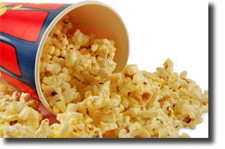Carbs In Popcorn

Facts about Carbs in Popcorn
Everyone today is looking for healthy snacks and with only 6 carbs in popcorn per serving, there couldn’t be a more wholesome snack. But how nutritious is popcorn?
Popcorn is a variety of corn; its kernels have a dense, starchy interior that is fully encased by a hard hull. The hull protects its interior from all elements, including moisture. When placed over high heat, the interior of the kernel heats to the extent that it bursts from the hull and explodes into a fluffy puff. In its natural state, with no additives, popcorn is high in fiber, low in calories, low in fat and has no salt nor sugar. Because it is corn, it is a starchy food which quickly converts during digestion into sugar.
The snack was discovered many, many years ago by the Native Americans, who used the treat in soups, decorations and as a snack. Over time, the popularity of popcorn spread. Because in its natural state it has little to offer in the way of flavor, salt began to be added to the snack. Over the years, various methods of flavoring the light snack began to develop; caramel topping made a sweet snack, butter gave it a rich flavor, cheese flavoring gave it more substance and simple sugar made a treat called Kettle Corn. Delicious snacks all; however, every time an element is added to the natural snack, it changes the nutritional value.
Some individuals focus more on the calories and the fat when looking at the nutritional value of foods. Carbohydrates are a valuable source of energy for the body, and therefore must be considered when planning a daily dietary structure. Once eaten, carbohydrates are digested before they are transformed into glucose. Glucose is sent to the blood stream where it is used as fuel, burned as energy that allows us to perform the activities we do each day. Additional fuel is found in stores of fat throughout our body; the system’s safeguard that we will always have the energy we need. Carbs becomes a problem when too much is eaten in a short period of time. Eating a meal that is excessively high in carbohydrates results in excessive glucose in the bloodstream; resulting in all of the energy burned comes from that glucose and the stored fat remains stored.
So why should we care about the carbohydrate count of popcorn? Snacks as well as our meals should be carefully measured into our daily food and caloric intake. Popcorn ranks as one of the top snacks in the United States and has such a light, airy presence that people mistakenly believe that its nutritional offerings are of little value. Our digestive systems do not categorize our food intake as snack or meal, simply as protein, carb, fat and other elements. In order to control the nutrition we take in through the day, everything we eat must be considered, including the carbs in popcorn.
Although there are few carbs in popcorn that is prepared in its natural state, a delicious carnival treat of caramel corn with added peanuts cannot make the same claim. The additional ingredients that give caramel corn its lip smacking goodness also gives it a full 34 grams of carbs per one cup serving. And it should be noted that nutritional value of even air-popped popcorn with no added salt, sugar or seasoning is often provided per one cup serving. One measured cup of popcorn may contain 50% air, which leaves very little popcorn for a serving.
Adding snacks like this to a well planned daily diet means closely monitoring the calories, protein, fat, sodium and carbs in popcorn. Kept in its natural state, popcorn can be a healthy snack.